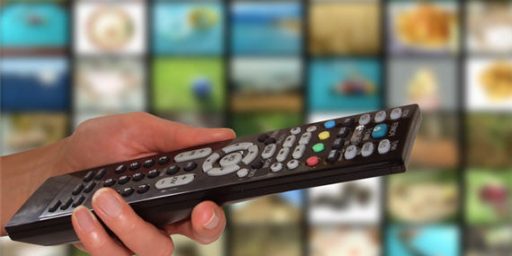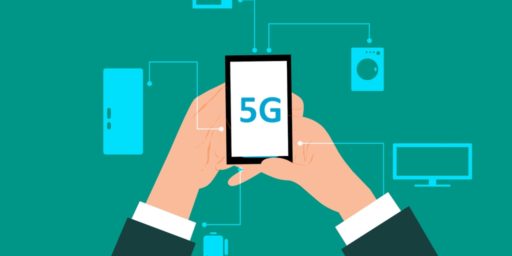Congress Considering Free HDTV for Poor
Congress is looking into a subsidy to aid poor people in the transition to digital television.
Congress signals subsidy for TVs (Washington Times)
The federal government wants to pay for some U.S. residents to be able to watch television — the only question is how much. The Senate’s budget bill, which passed last week, contains a $3 billion subsidy for owners of televisions that are not ready to handle the eventual transition to digital television. The House budget bill, which ran into trouble Thursday but which will be on the floor this week, contains slightly less than $1 billion. Both bills set a date when broadcasters must return their current licenses and instead broadcast a digital signal on a different part of the electronic spectrum.
The subsidy would go to pay for converter boxes, which would take the digital signal from the broadcasters and convert it so that it can be displayed by analog TVs. Televisions hooked up to cable or satellite would not need the converters, nor would televisions capable of receiving a digital signal. “There are enough low-income Americans that would have difficulty coming up with the $40 or the $50 for a conversion box, so we want to help them out on a one-time basis,” said House Energy and Commerce Committee Chairman Joe L. Barton, Texas Republican, who is pushing for finishing the transfer to digital broadcasting. “Since it’s a federal law that we’re saying you have to broadcast digitally, and we have lots of TV sets in this country that are still good that aren’t digitally capable, I think it’s reasonable to have a modest subsidy on a one-time basis,” he said.
Some say the government shouldn’t be paying at all. “What the taxpayers are being asked to suffer is a transfer of money from their pocket basically to the living rooms of the television-watching public,” said Sen. John Cornyn, Texas Republican.
Cornyn and Barton are both right. Congress has no business subsidizing television viewing. At the same time, though, Congress should not be in the business of passing laws arbitrarily favoring the obsolescence of non-harmful extant technologies. If we’re going to do that and imposing hardship on people, then there’s a pretty strong case for absorbing that hardship. (And, if we’re going to get upset about the “welfare” angle, let’s focus on the billions of dollars the broadcast spectrum Congress is giving to broadcasters is worth rather than this piddling sum.)
The real question is, Why is Congress pushing so hard for digital television?
Why, it’s the national security of course.
Digital TV Switch Nears a Date (PC World, Nov. 7)
The Senate has voted to set April 7, 2009, as the deadline for U.S. television stations to switch to digital broadcasts and free up analog radio spectrum for wireless broadband and public-safety uses. The Senate approved the digital-television (DTV) transition deadline late last week as part of a large budget package aimed at reducing the federal deficit. Auctioning off part of the freed-up spectrum is expected to raise $10 billion or more, with $5 billion going to the U.S. treasury in the Senate legislation.
[…]
A group of technology companies has been pressing for a firm deadline for the DTV transition, saying the new spectrum will be optimal for deploying next-generation wireless services.
Supporters of a hard deadline say first responders such as police and firefighters need additional spectrum to improve interoperability between the multiple emergency response agencies in metropolitan areas. Following the September 11, 2001, terrorists attacks on the U.S., the national 9/11 Commission recommended that emergency responders should have additional radio spectrum. In many cases, the multiple emergency-response agencies responding to the September 11 attacks couldn’t communicate with each other because their radios operated on different spectrum bands.
Under current law, broadcasters are required to give up their analog spectrum by the end of 2006, but only in television markets where 85 percent of homes can receive digital signals. While cable-television service can convert digital signals for analog sets, some estimates say there are tens of millions of analog TV sets that receive signals over the air. Those sets won’t work after the DTV transition without converter boxes.
In December 1997, the Federal Communications Commission voted to reallocate some frequencies in the 700MHz band to public safety and new commercial uses, in exchange for the digital spectrum TV stations received. Most television markets would never reach the 85 percent digital threshold now in law without a hard DTV deadline, critics say.
Also on Thursday, the FCC moved up the deadline that all TVs sold in the U.S. must be capable of receiving digital signals. The commission moved up the date by four months, with the new deadline now March 1, 2007. The FCC has phased in deadlines for large TV sets to be digital ready; all TV sets with screens larger than 36 inches were required to be digital ready by July 1 of this year.
The problem with that rationale is that it is post hoc. The FCC long ago (1997) mandated this transition by December 2006. Nobody was arguing about “first responders” back then.
The Heritage Foundation’s James L. Gattuso surprisingly, thinks urgent action by Congress was necessary and that, indeed, action has been too slow.
In 1997, the FCC, as directed by Congress, established a plan for the transition to DTV. Each existing broadcaster received a new six-megahertz block of spectrum to transmit DTV signals. They would have to return their old, “analog†spectrum after the transition—set to occur on December 31, 2006, provided that 85 percent of households had access to DTV by that time. The old frequencies would then be auctioned off, potentially raising billions of dollars, and put to other uses, such as wireless telephony.
The net effect of this plan was to grant existing broadcasters use of two huge blocks of spectrum, free of charge. This giveaway raised quite a few eyebrows because elsewhere the FCC was auctioning the use of valuable spectrum to the highest bidders. Aside from the billions in lost government revenue, the plan left broadcasters with little incentive to return their old spectrum.
ince that time, the digital transition has proceeded at a snail̢۪s pace. With less than one-and-a-half years to go before the 2006 deadline, almost no one is watching over-the-air DTV broadcasts. While close to ten percent of households have digital television sets, the content mostly comes through cable, satellite, and DVDs. Only two percent of households own TV sets that can receive digital broadcasts.
It should not be surprising that broadcast DTV is falling flat. Whatever the advantages of digital technology, fewer and fewer Americans are watching broadcast TV. Only some 15 percent of viewers receive terrestrial TV signals. And the viewers most likely to want digital service are the ones least likely to watch over-the-air TV. How may videophiles have rabbit ears on their TVs?
By itself, consumers̢۪ lukewarm reception of digital broadcasting should not concern policymakers. Government should have no role in determining technological winners and losers. Whether viewers are unimpressed with DTV or choose to receive it via cable rather than broadcast, policymakers should not try to impose their own preferences.
The transition to DTV nevertheless is critical, but for a different reason: the old TV frequencies are extremely valuable and can be used to provide innovative new wireless services, from expanded smart-phone services to wireless Internet connections. Until the transition is made, however, this valuable electromagnetic real estate will be virtually wasted.
His conclusion, though, is rather odd:
Washington should be neutral on broadcasting technology, as with any other industry. The real issue here is the valuable spectrum that was given to broadcasters in the 1990s, on the understanding that their old frequencies be returned. Retrieving this spectrum and making it available for other uses should be policymakers’ main goal. Congress should set a ‘hard’ date by which old spectrum will be relinquished. This should be done with few or no consumer subsidies and without any new mandates.
So, Congress should impose a radical technological transition in order to receive the rather ancillary benefit of the gain of the currently occupied frequencies but without creating the conditions that would allow for economies of scale in the transition or softening what amounts to a “taking” of private property (the television sets they bought) from regular folks?






Once again we see government involvement in what should have been left to the free market.
When will they learn and when will we learn?
It is interesting to see how the Washington Times blames the ‘government’ for offering these subsidies. Did it ever occur to them that it is conservatives, just like them, that are passing these laws? And it bothers them even less that conservatives are not only spending money like drunken sailors but are borrowing from the communists Chinese in order to so and leaving the debt to our children. Some family values.
Well Ken,
It is either pass this insane law and encounter the wrath you just posted, or reject the law and get accused of racism. Either way, there’s not much conservatives can do to appease jackasses like yourself.
The original impetus, waaay back when, was because ohmygodthejapanese were going to beat us in technology and we had to beat them at their own industrial planning game that was serving them so well.
Once the cart was rolling, however rickety, no amount of the Japanese economy falling apart could stop it.
Mark,
Guess the “conservative” members of the GOP congress don’t have the guts to stand on principal and live within their means.
Well we have to stay clearly focused on GOP priorities, such as tax cuts for billionaires.
There is another interesting part of this — WaPo carred this story 2 1/2 weeks ago –
Which I posted against –
Talk about pork – $3B for Television?
It is estimated that converter boxes would cost about $50. And Senator Stevens plan would call for the government to pay roughly $40, and the consumer would make a co-payment of $10.
What a joke. I love HDTV — but not $3B worth.
“The real question is, Why is Congress pushing so hard for digital television?”
Once analog TV goes away, the government can auction off the spectrum reserved for them for a lot of money. There’s precious little spectrum left for the new wireless and satellite systems being thought of and they will bid in the billions for those rights.
DC has it exactly correct.
There’s literally billions of revenue to be made off the sale of such spectrum as will be vacated by the demise of analouge over the air TV stations.
I want to know when I’m going to get my check?
I sure don’t have money to waste/spend on digital TV, so it looks as though I’ll be left out of the revolution.
Let’s get a law that gives everyone the price of a 21″ digital TV and call it quits after that. Eligibility is restricted to those providing a current and valid voter ID, of course. Except in Massachusetts and California, where a pulse will suffice.
John: My understanding is that the subsidy would be only for the converter box for regular sets that would allow people to watch analog-quality television without buying a new set.
Your headline is misleading. This is about digital TV, not HDTV. They are not the same thing. HDTV is a luxury, while digital TV is just a standard.